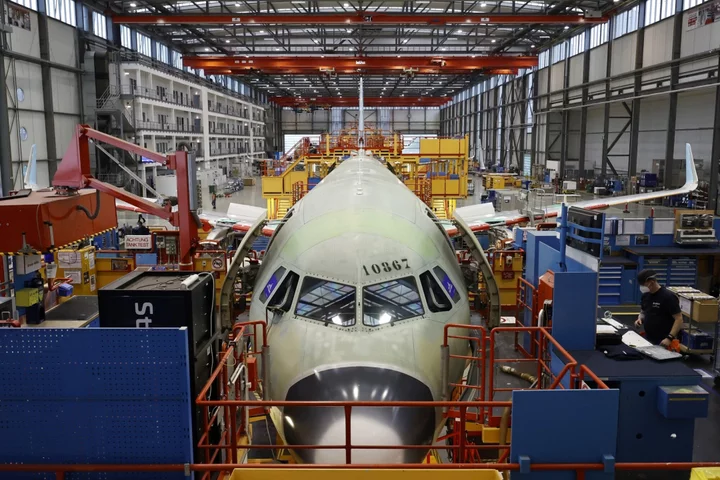Airbus SE said it will significantly increase aircraft output next year as the European planemaker ramps up production across its model range to meet surging demand.
The company didn’t provide a new target for output, while saying it’s confident of meeting its goal of 720 deliveries in 2023. The planemaker will increase production of its A350 widebody aircraft, adding to previously announced higher rates on its best-selling A321neo and smaller A220 models.
“By definition, by nature, the 2024 output will be significantly higher than 2023, and we’ll be more specific at the beginning of next year,” Chief Executive Officer Guillaume Faury said on a call with reporters after the planemaker reported quarterly earnings.
Planemakers are trying to strike a balance between customers buying planes in record numbers and suppliers struggling to keep up with the faster pace of production. Both Airbus and rival Boeing Co. have encountered roadblocks with manufacturing faults at some parts companies, making their ambitious output goals more challenging.
Airbus declined as much as 3.1%, or €4, to €126.34, its biggest drop in almost a month. The company fell short of analyst profit estimates largely because of charges at its defence and space unit. Third-quarter adjusted profit before interest and tax reached €1.01 billion ($1.1 billion), while analysts had surveyed by Bloomberg had estimated €1.17 billion.
The European company still has 161 deliveries to go in the final two months if it wants to meet its target.
Airbus said Wednesday that it plans to raise output on the A350 to 10 a month in 2026, after previously saying it would reach 9 by the end of 2025. The aircraft has been a major seller for the company this year, particularly the larger A350-1000 variant that can ply the longest routes, with Airbus approaching an unprecedented 100 individual orders for the plane.
While the recovery in long-haul travel took more time after the pandemic than shorter routes, demand for trans-Atlantic flights and trips between Europe and Asia has surged in the last six months. More airlines are also ordering planes that can fly extended routes, in part because closed air spaces over Russia, Ukraine and certain sections of the Middle East have made detour journeys more common.
Division Review
Boeing is also increasing output of its popular 787 widebody model. The company is moving in on a target of assembling five of the twin-aisle 787 Dreamliner, which competes with the A350, per month by the close of the year. The US company plans to then double production of the carbon-composite 787 over the next two to three years to keep pace with booming sales.
In the third quarter, revenue at Airbus rose 12% to €14.9 billion, broadly in line with analyst estimates of 14.96 billion. The planemaker took a charge of about €400 million in the first nine months due to delays and cost overruns on a satellite program.
Airbus’s American Depositary Receipts fell 0.5% to $34.25. The shares closed 0.9% higher in Europe ahead of the earnings’ report.
The company said it has initiated a review of its Defence and Space unit, with a plan to rebalance risks and improve competitiveness. The unit lost €79 million before interest and taxes in the quarter. Faury said the company doesn’t plan to exit the business and expects a transformation to take as many as five years.
Supply Issues
Airbus has been struggling to ramp up output of its bestselling A321neo model even as the backlog for the model stretches past the end of this decade. The planemaker said that the supply chain for the industry continues to be constrained as it reiterated its long-term ambition of building 75 A320neo jets a month by 2026.
Last month, Boeing cut its target for deliveries of its workhorse 737 model due to expanded inspections and rework following manufacturing glitches by a supplier.
Alongside existing part shortages, Airbus is contending with potentially flawed components on Pratt & Whitney engines powering its A320neo aircraft. Next year will likely see hundreds of aircraft on the ground at any given time for inspection, further curtailing already strained capacity.
Airbus is working with Pratt to balance deliveries of engines for new aircraft along with ensuring an adequate supply of spare engines for the existing fleet, Faury said.
(Updates with shares in fifth paragraph)

